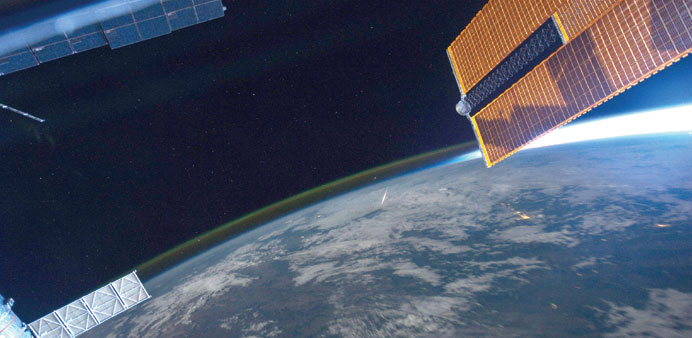This Nasa image shows what Astronaut Ron Garan, Expedition 28 flight engineer, tweeted in this image from the International Space Station in August, 2011 with the following caption: “What a Shooting Star looks like from space, taken yesterday during Perseid Meteor Shower.”
AFP/Miami
Worms, lettuce and a massive parking station for future spaceships are aboard SpaceX’s unmanned Dragon cargo capsule, poised for a launch today.
The blast-off of the white, gumdrop-shaped spaceship atop the California-based company’s Falcon 9 rocket is set for 10:21am (1421 GMT) from Cape Canaveral, Florida.
Shortly after launch, SpaceX will make a third attempt to land its rocket on an ocean platform. This is part of CEO Elon Musk’s vision of revamping the rocket industry by making expensive rocket parts re-usable instead of discarding them in the ocean as happens now.
Moments after launch, as the Dragon heads for orbit, the tall section of the rocket will ignite its engines and guide itself back to a floating barge in the Atlantic for an upright landing.
SpaceX’s first try in January ended in failure. The rocket collided with the drone ship platform, after running out of the hydraulic fluid needed to power its steering fins. During a second try in April, the 67,000-lb (30,000-kg) rocket managed to set itself down on the platform in an upright position, but tipped over and exploded seconds later.
SpaceX blamed a malfunctioning valve controlling the rocket’s engine power for the unsteady landing.
The SpaceX vice president of mission assurance, Hans Koenigsmann, said company experts have learned from past attempts, but it would be hard to predict the chances of success on Sunday.
“You look at the data, you evaluate this and then you make a correction and that is ultimately how you succeed,” he told reporters on Friday.
The Dragon spacecraft will deliver 4,000lb (1,800kg) of food, supplies and science experiments to the International Space Station, where two Russian cosmonauts and one American astronaut are living.
Nasa’s Scott Kelly and Roscosmos’ Mikhail Kornienko are four months into a planned year-long stay in space. The space station commander is Gennady Padalka.
SpaceX is now the only American company capable of sending cargo to space. Orbital Sciences’ program is on hold, after one of its rockets exploded on the launchpad last year and destroyed its fully loaded Cygnus cargo carrier.
Russia’s supply programme also suffered a setback in April when it lost control of its Progress cargo ship and the unmanned capsule burned up on re-entry to Earth’s atmosphere a couple of weeks later.
The Dragon’s cargo includes the first of two International Docking Adaptors, which are essentially parking spots that are meant to make it easier for a variety of commercial supply ships to latch onto the orbiting lab in years to come.

